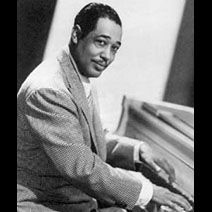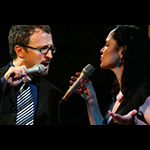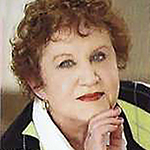Songs and Stories with Harvey Granat
On Duke Ellington
92nd Street Y, NYC, September 27, 2018
Reviewed by Alix Cohen for Cabaret Scenes

Kicking off his new season at the 92nd Street Y, Harvey Granat salutes composer/pianist/ jazz orchestra leader Edward Kennedy “Duke” Ellington (1899-1974.) Raised with particular attention to manners and style, Ellington was the epitome of a gentleman musician. Though he didn’t take piano lessons seriously until his mid-teens, the artist rose from performing at parties to The Cotton Club to international recognition writing thousands of compositions and leaving an indelible mark on the history of jazz and beyond (he called it “beyond category.”) Some of the finest musicians in jazz history were in the Ellington orchestra.
Granat opens by asking Ellington’s granddaughter, Mercedes Ellington, how he acquired the moniker “Duke.” She responds that at the time, band leaders such as Earl Fatha Hines and Count Basie were drawn to “distinguished titles.” She recalled Duke’s elegance and spoke of a trip to Russia where he was popularly known only through Radio Free America. (As a dancer with the Alvin Ailey Company, she traveled with the Ellington Orchestra at the invitation of the U.S. State Department.)
Today’s first number is “Mood Indigo” (lyrics: Mitchell Parish). It’s seriously blue in Granat’s hands—quiet, diminished in spirit.
Though Ellington’s then manager, Irving Mills’ name is on the song (and many others), he never wrote a thing. As Mills provided financing to expand the orchestra, its leader included him in credits out of gratitude. The family continues to reap royalties. “Solitude” (Eddie DeLange) follows like a barely healed wound. “Dear Lord above/Send back my love”is prayerful.
The Ellington Orchestra appeared in Ziegfeld’s 1929 musical Show Girl. “Ellington had a unique conducting style,” Granat comments. “How did he manage to conduct from the piano?
https://www.thescanfoundation.org/wp-content/languages/new/amoxicillin.html
” We’re told it’s a matter of body language sometimes including “eye gestures.” “I Let a Song Go Out of My Heart” (Henry Nemo) is jaunty but not without substance. Fingers clasped, Granat taps his foot on the stool rung.
In the late 1950s, Ellington was commissioned by The Stratford Festival to write a series of suites based on the language and stories of Shakespeare. Like Gershwin, he had the background and ability to compose what we think of as “serious music.” “So many of our great composers tried to carve out a place in the classical world,” Granat says, implying few others succeeded. Pianist David Lahm offers “The Star-Crossed Lovers” (Billy Strayhorn) an allusion to Romeo and Juliet. It’s a sympathetic, if-only piece played with great sensitivity.
Telling us Ellington is “near to my heart, my voice, and my fingers,” performer Daryl Sherman sings “All Too Soon” (Carl Sigman) with a Lahm at the piano, then takes the keys herself for “Everything But You” (Harry James/Don George). Sherman’s voice is very much a musical instrument. The last “all” emerges in five syllables, while “everything” begins with light scat and arrives insouciant with the vocal riding above the notes.
How many things can you rhyme with “Azalea” Granat quips, referring to the Ellington song. As it turns out, regalia, assail ya, fail ya— it’s a lovely melody hauntingly played by Lahm. “I Got It Bad (and That Ain’t Good)”(Paul Francis Webster) is tender: “My poor heart is sentimental, not made of wood,” Granat draws in his chin, “cryin’ my heart out” he sings with fatalism.
We learn a little about the now virtual, education-oriented Duke Ellington Center for The Arts which is looking for a location near 125th Street (http://decfa.org/), though not very much about Ellington’s life.
Duke Ellington wrote until he passed.
There was a piano at the foot of his hospital bed , and his granddaughter brought him blank sheet music.
https://www.thescanfoundation.org/wp-content/languages/new/remdesivir.html
Granat notes that Ellington “posthumously made it big on Broadway with 1981’s Sophisticated Ladies showcasing his work. His son, Mercer Ellington, conducted. Mercedes Ellington danced in it. It’s a family legacy.
NEXT in Granat’s series: On Yip Harburg, Part 2 with Harburg’s son, Ernie Harburg, his wife, author, music historian and founding chair of the Musical Theater program at NYU’s Tisch School of the Arts, Deena Rosenberg Harburg, and a guest vocalist. Thursday November 1, 12 PM





